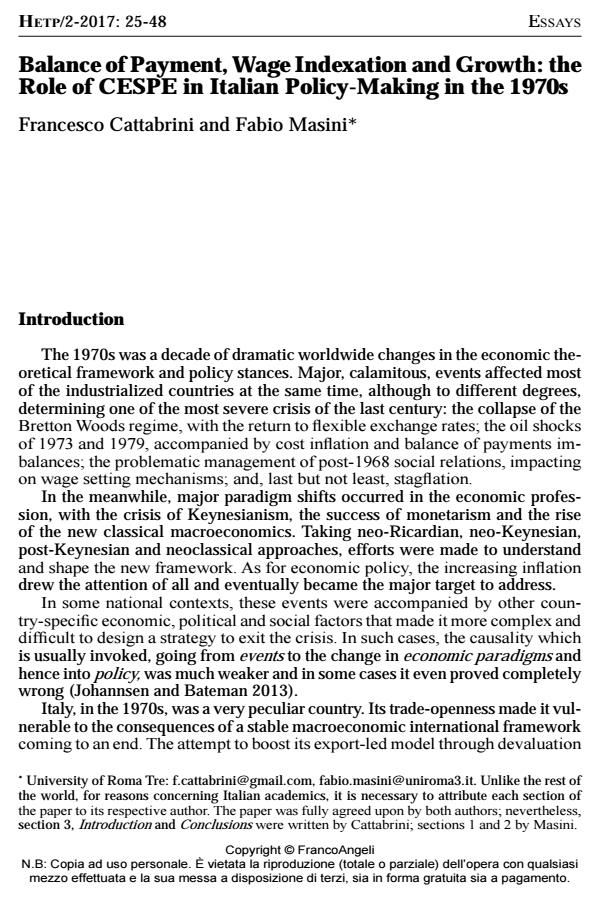Balance of Payment, Wage Indexation and Growth: the Role of CESPE in Italian Policy-Making in the 1970s
Journal title HISTORY OF ECONOMIC THOUGHT AND POLICY
Author/s Francesco Cattabrini, Fabio Masini
Publishing Year 2017 Issue 2017/2
Language English Pages 24 P. 25-48 File size 253 KB
DOI 10.3280/SPE2017-002002
DOI is like a bar code for intellectual property: to have more infomation
click here
Below, you can see the article first page
If you want to buy this article in PDF format, you can do it, following the instructions to buy download credits

FrancoAngeli is member of Publishers International Linking Association, Inc (PILA), a not-for-profit association which run the CrossRef service enabling links to and from online scholarly content.
Italian policy-making changed dramatically during the Seventies. Exogenous events (like the end of the Bretton Woods system and the oil shocks) and endogenous transformations of the major economic (wage indexation, planning system, instrument of governmental intervention in industries, tax system, relationship between monetary authority and Treasury) and political institutions (workers statute, public health insurance, role of regions, school system) deeply changed the Italian society. Such changes were accompanied and often guided by experts, who exerted a major influence on policymaking. This influence mainly operated through some influential think tanks, which set the table for fundamental public policies. Among them, one of the most relevant was CESPE, the research centre of the Italian Communist Party, to which most leading Italian economists of the time gave their contribution, and that organized several workshops and published research and policy papers. The aim of the paper is to highlight the contribution CESPE gave to the transformation of Italian policy-making in the Seventies.
Keywords: Italian policy-making, think-tanks, wage indexation, balance of payment, external contraint
Jel codes: A11, B2, E1, E65
- Italy, 1982: the case for Ecu-denominated Treasury bonds Fabio Masini, Albertina Nania, in The European Journal of the History of Economic Thought /2024 pp.468
DOI: 10.1080/09672567.2024.2329053 - Selective Neoliberalism: How Italy Went from Dualization to Liberalisation in Labour Market and Pension Reforms Emanuele Ferragina, Alessandro Arrigoni, in New Political Economy /2021 pp.964
DOI: 10.1080/13563467.2020.1865898 - The social and political bases of political economy: interpreting and periodising Italian developments since WWII Emanuele Ferragina, Alessandro Arrigoni, in New Political Economy /2024 pp.770
DOI: 10.1080/13563467.2024.2344854 - An intellectual boost for Italy’s Europeanisation: the contribution of the influential think tanks Arel and Nomisma (1978–1993) Luca Sandonà, in The European Journal of the History of Economic Thought /2021 pp.324
DOI: 10.1080/09672567.2020.1817118 - Tracing neoliberalism in Italy: intellectual and political connections Fabio Masini, in The European Journal of the History of Economic Thought /2019 pp.327
DOI: 10.1080/09672567.2019.1575444
Francesco Cattabrini, Fabio Masini, Balance of Payment, Wage Indexation and Growth: the Role of CESPE in Italian Policy-Making in the 1970s in "HISTORY OF ECONOMIC THOUGHT AND POLICY" 2/2017, pp 25-48, DOI: 10.3280/SPE2017-002002